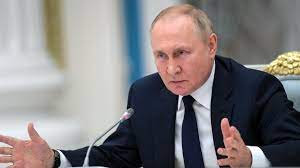Alexander Rodnyansky
On 18 May, a Moscow court ordered my arrest in absentia. In a couple of weeks I will know my sentence for the crime of “spreading disinformation” about the Russian army, which means speaking out against the war in Ukraine and telling the world about the atrocities that Russian soldiers commit in my native country. I can guess what the verdict will be – since the introduction of this penal code article, not one of the accused has been found not guilty. I can also guess my sentence, since I share the same judge as the Russian writer Dmitry Glukhovsky, who was recently sentenced to eight years for his anti-war position.
No other country in the world recognises this crime and I don’t either. I will continue to speak out against the invasion on every platform available to me. Ahead of my sentencing, I want to share a message that I feel is important. Moscow was my home for nearly 20 years. Two of the films I produced were nominated for Academy Awards; one of these films, Leviathan, became the first Russian film to win a Golden Globe since 1969. I speak Russian, I even wrote books in Russian – and I produced films that brought praise and international recognition to the Russian film industry.
The Russian state is fully aware that it has no means to imprison me and yet still the Russian justice system spent time and effort on my prosecution. The reasons behind this decision are very simple. Like others before me – activist Ilya Krasilshchik, journalist Alexander Nevzorov, blogger Veronika Belotserkovskaya and Glukhovsky – I need to serve as an example of what happens to people who publicly criticise the war. Ahead of my sentencing, I called upon some of my closest Russian friends to ask if they would be willing to provide a character testimony. They all refused. “If there was the smallest chance that my testimony would change the outcome, I would’ve come, but you know there isn’t. I can’t risk it,” said one of them. And he was absolutely right. The scare tactics employed by Putin work – people are afraid. Some of my friends in Moscow are too nervous to call or text me. Even when they travel to Europe on holiday they dare not approach me. They are afraid that someone will take a picture of them with me, an enemy of Putin’s state, which would destroy their careers or even lead to prosecution.
My personal experience is emblematic of the state of the country. Putin has managed to scare a nation into submission, arresting those who have spoken out against the war and sentencing them to jail time for their beliefs. Just days ago, a journalist in Khakassia was sentenced to five and a half years for writing a story about 11 Russian soldiers who refused to fight in Ukraine. Fear is everywhere in Russia – but fear is not the same as support. At the weekend, Russia had its biggest regional elections of the year. The results brought an overwhelming victory for Putin’s party, with claims of widespread rigging. But it was interesting to note that the candidates all but avoided talking about the war. The mayor of Moscow, Sergey Sobyanin, probably the second most powerful politician in Russia, has spoken about the war twice since the invasion of Ukraine in February last year. The war effort was not mentioned once in his campaign. The regional press has reported that in Buryatia, the region with the highest war casualties, local politicians and officials have stopped talking about the war altogether. Some of them have even publicly stated their wish for the war to end as soon as possible. In the small town of Krasnokamsk in the Perm region, a candidate from the Yabloko party got elected into the local Duma under the slogan “I am for peace.”
Putin has made every effort to project an image of unity, to signal to Ukraine and the west that there is a strong pro-war sentiment across Russia. This is a part of his strategy to frighten Ukraine’s allies and make them feel as though resistance is futile, to push them to grow tired of supporting Kyiv. But it is a bluff. Russia is afraid. The Russian population has chosen to stay silent, and to retreat into the predictable comfort of everyday life and ignoring the war at all costs. The public have largely chosen to leave the fighting to those who give or follow orders. This is not support. Russians will not defend Putin when they are eventually defeated in Ukraine. He has made sure no one dares to go into the streets to protest against his politics, and in doing so has ensured that no one will help him when his time comes.
The Guardian







